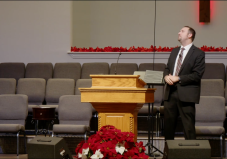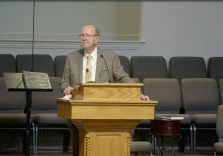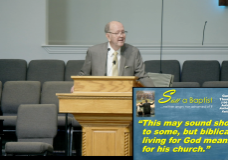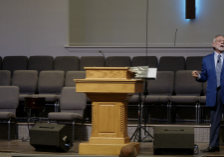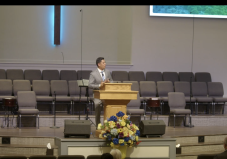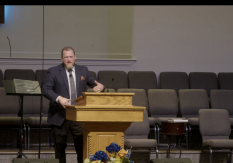The podcast focuses on the foundational significance of the New Testament church, emphasizing that Jesus Christ himself established the first church. The speakers articulate that the church is not merely a human institution but a divine one, rooted in the teachings and authority of Christ as outlined in scripture, particularly in Matthew chapter 16. They underscore the historical continuity of the church, asserting that it has existed from the time of Christ, contrary to some modern interpretations that suggest a later development. The episode also highlights the importance of the local church as essential to the believer’s spiritual life, countering notions of a universal and invisible church. Overall, the discussion serves to reaffirm the church’s role in Christian life and its necessity in fulfilling God’s mission on earth.
A key theme in the podcast revolves around the foundational role of Jesus Christ in establishing New Testament churches, with Brother Locke firmly asserting that the church’s inception was a divine act rather than a human endeavor. He references Matthew 16 to illustrate how Christ himself laid the groundwork for the church, challenging the common belief that the church emerged as a result of later historical developments or human decisions. Locke emphasizes that the church is a New Testament institution, which is essential for believers today, and he argues that understanding its divine origin is crucial for grasping its significance in the lives of Christians.
Locke also highlights the necessity of local and visible churches, as opposed to a more abstract notion of a universal church. He articulates that every New Testament reference to the church pertains to a local assembly, which is vital for fostering community and accountability among believers. The speaker warns that misconceptions about the nature of the church can lead to a diminished understanding of its importance, which in turn can result in spiritual stagnation and a lack of engagement among Christians. He advocates for active participation in local congregations, encouraging listeners to reflect on their own church affiliations and to strive for meaningful involvement in their communities of faith.
The episode’s serious tone reinforces the urgency of Locke’s message, urging believers to recognize the essential nature of the church in their spiritual lives. By framing the church as a critical institution ordained by Christ, he calls for a renewed commitment to local church communities, reminding listeners that their growth in faith is intricately linked to their engagement with the body of Christ.
Transcript
Amen.
Speaker A:They don't light your fire, your woods wet.
Speaker A:Amen.
Speaker A:Some good music this morning.
Speaker A:I appreciate our choir musicians and do such a wonderful job and it is good to have Brother Locke with us this morning.
Speaker A:And Brother Locke is the former pastor of Lake Worth Baptist Church, but pastored there for years and years.
Speaker A:As your emeritus title, I don't know, but minister at large.
Speaker A:And not a large ministry, the ministry at large.
Speaker A:And it's good to see Brother Zellner here this morning as well.
Speaker A:And I know Brother Zellner and Brother Locke are good friends.
Speaker A:And Brother Locke, you come on preach to us this morning.
Speaker B:Thank you, my friend.
Speaker B:Thank you.
Speaker B:Well, let me take a moment, if I might today to say how I am such indebted to Edwin Zellner.
Speaker B:61 years ago I walked into his life and as a professor at a Bible college and we have had an ongoing relationship that's been very positive and profitable for me.
Speaker B:Don't believe anything he says about fly fishing, though we have had some times out on the.
Speaker B:Out on the streams and have enjoyed that time.
Speaker B:But what a precious man brother Zellner is.
Speaker B:And you've been blessed having been in your church for a while.
Speaker B:And I thank God for him.
Speaker B:Turn your Bibles today to Matthew chapter 16, if you will, please.
Speaker B:Matthew, chapter 16.
Speaker B:I want to preach today, this afternoon about the beginning of New Testament churches.
Speaker B:The beginning of New Testament churches.
Speaker B:ould be from Thomas Edison in:Speaker B:Aren't you glad you're living in an illuminated building today?
Speaker B:Somebody said if it hadn't been for.
Speaker C:Thomas Edison, you'd have to watch TV in the dark.
Speaker B:Praise God.
Speaker B:Amen.
Speaker C:Now aren't you glad you're not flying.
Speaker B:To someplace distant in that little contraption yet?
Speaker C:That's how people traveled years ago.
Speaker B:We can thank the Wright brothers for the traveling of airplanes that take us all over the world today.
Speaker B:And you can thank Henry Ford for.
Speaker C:Putting together a simulign of T models.
Speaker B:And have changed the world about transportation today.
Speaker C:But if you're going to study about.
Speaker B:The first church, you're going to have.
Speaker C:To turn to Matthew 16.
Speaker C:And you're going to need to understand that Jesus Christ started the first church.
Speaker B:Matthew 16, verse 17.
Speaker B:And Jesus answered and said unto him, that's to Peter.
Speaker C:Blessed art thou, Simon Barjona.
Speaker C:For flesh and blood hath not revealed.
Speaker B:Unto thee, but my father which is in heaven.
Speaker C:And I say also unto thee that thou art Peter.
Speaker C:And upon this rock I will build my church.
Speaker C:And the gates of hell shall not prevail against it.
Speaker C:And I give unto thee the keys of the kingdom of heaven.
Speaker B:And whatsoever thou shalt bind on earth.
Speaker C:Shall be bound in heaven.
Speaker C:Whatsoever thou shalt loose on earth shall.
Speaker B:Be loosed in heaven.
Speaker C:You need to know this about the church.
Speaker B:Jesus planted the first church.
Speaker C:He planted the first church.
Speaker B:He's the one that thought about it.
Speaker C:Now, I know most people think, well, I bet it was a committee of.
Speaker B:Preachers that got together and wanted to.
Speaker C:Foul up our weekend.
Speaker B:So he created the church.
Speaker C:No, Jesus started the first church.
Speaker B:He's the source of it.
Speaker C:He also possesses the church.
Speaker C:He said, I will build my church.
Speaker C:Not your church, not our church, his church.
Speaker C:He's been doing that now for 2,000 years.
Speaker C:He purchased that church with his own blood.
Speaker B:He also presides over it as the head of the church.
Speaker C:He's present here today.
Speaker C:I don't know how many you have here today.
Speaker C:I hope it's another record attendance.
Speaker C:But you need to add one more to it.
Speaker B:Jesus is here today.
Speaker C:He promised to walk in among us and do his work in our lives and thank God for that.
Speaker C:erpetuated the church for now:Speaker C:That first church then became churches.
Speaker C:This is, by the way, the first time the word church is used in the Bible.
Speaker C:And it's directly connected to Jesus Christ himself.
Speaker C:See, the church was built by Jesus.
Speaker B:On Jesus, and for Jesus.
Speaker C:We're not here for ourselves.
Speaker C:We're here for him.
Speaker B:He's the one that made this all possible.
Speaker C:And so the first thing I want to say today is that the origin.
Speaker B:Of the New Testament church is divine and not human.
Speaker C:This church has started.
Speaker C:That Jesus started was a divine church.
Speaker C:It wasn't started by a bunch of men.
Speaker C:Men have started churches.
Speaker B:But the church Jesus started was a divine institution.
Speaker B:The church is not an Old Testament institution.
Speaker B:It's a New Testament institution.
Speaker B:You don't find the church in the Old Testament, not the church of Jesus Christ.
Speaker B:It's in the New Testament.
Speaker C:The church was founded by Jesus Christ.
Speaker B:During his earthly ministry.
Speaker B:If you would turn to Mark 3.
Speaker C:Or Luke 6, you can do that at your convenience.
Speaker B:You can.
Speaker C:You'd find out that after a night of prayer, Jesus took From the disciples 12 men that he ordained to be with him.
Speaker C:And those those 12 became the first church.
Speaker C:st Corinthians:Speaker C:Apostles says in Ephesians 2 that the church is built upon the foundation of the apostles and Jesus Christ is the chief cornerstone.
Speaker B:Are you with me?
Speaker C:Today Jesus Christ started the first church.
Speaker B:LR.
Speaker B:Scarborough said.
Speaker B:It's certainly true that Christ, in his own personal ministry, established his church.
Speaker B:LR Scarborough was the second president of Southwestern Seminary.
Speaker B:You'll find most Southern Baptists, and if you're here today, you'll tolerate this.
Speaker B:But most Southern Baptists do not believe in an ancient beginning, but in a modern beginning.
Speaker C:They believe the church started much later.
Speaker B:Than Christ and not by Christ himself.
Speaker C:Out of the material prepared by John.
Speaker B:The Baptist, Jesus organized and founded his churches during the days of his personal ministry here on the earth.
Speaker B:The church was not founded on the day of Pentecost by the Holy Spirit.
Speaker B:Was not founded on the day of Pentecost by the Holy Spirit.
Speaker B:Most people believe that.
Speaker B:They believe it because it's been taught to them.
Speaker B:But the fact is, the day of Pentecost was not the formation of the church.
Speaker B:It was the confirmation of the church.
Speaker C:You remember the buildings that God had built?
Speaker C:He had a temporary tabernacle.
Speaker C:What happened to that tabernacle?
Speaker B:When it was put together, a cloud.
Speaker C:Of glory came on it and identified.
Speaker B:That as the house of God.
Speaker B:When the temple was built, what happened?
Speaker C:A glory cloud came over the temple and it identified it as the house of God.
Speaker C:And by the time Jesus came around when he built the church, when he left, he said, I'm going to give you the Spirit.
Speaker B:And when the day of Pentecost came.
Speaker C:Another cloud of glory came on that.
Speaker B:And that was the work of the Lord on that new house.
Speaker B:He's got a new house in the neighborhood now, and that house is the Lord's church.
Speaker B:And so the Father envisioned the church, and the Son equipped the church, and the Spirit empowered the church.
Speaker B:Number two, the nature of the New Testament church is local and visible, not universal and invisible.
Speaker B:Gray Allison, who I got to preach a conference with, once said this.
Speaker B:The Ecclesia is a local church.
Speaker C:This is what Christ meant when he used the Word.
Speaker B:Would the apostles have been able to understand any other meaning?
Speaker B:What other kind can minister the word to lost persons as well as minister the physical needs of poor other Other kind?
Speaker B:Or what other kind can preach the gospel?
Speaker B:You see, the church is local and visible.
Speaker C:Now, when I use the term local.
Speaker B:Church, that's a redundancy.
Speaker C:That's the only kind of church in the Bible.
Speaker C:That's like saying widow woman.
Speaker C:Well, if she's a widow, she's a woman.
Speaker C:If you have a free gift, you don't need to put free on it.
Speaker C:If it's a gift, it's free.
Speaker C:If it's ancient history, you already know it's ancient because it's history.
Speaker C:It's redundant to say local church.
Speaker C:Now the only reason that I use it is to clarify it for those who don't understand what the New Testament.
Speaker B:Says about the church.
Speaker B:One of our pastors in this area, Bob Pearl over at Birchman Avenue Baptist Church, wrote a book called the the Vanishing Church.
Speaker B:And he said this.
Speaker B:Why all the debate about the distinction between the universal and local church?
Speaker B:Why spend all so much time on the etymology of ecclesia and its uses in the New Testament?
Speaker B:The reason is simple.
Speaker C:Misunderstanding the New Testament concept of the.
Speaker B:Church diminishes the importance of the local church to the individual believer.
Speaker B:With the local church, when the local church is trumped by the universal church, personal accountability is minimized, Christian's growth is stunted and practically the local church vanishes.
Speaker B:That's the title of his church, the Vanishing Church.
Speaker B:People move from church to church to bless each congregation with their gifts and insights only to become spiritual pygmies.
Speaker B:That's what he said.
Speaker B:The work of God in this world is done primarily through the local congregation.
Speaker B:That's God's plan.
Speaker B:That's God's plan.
Speaker C:You're in the right place today for.
Speaker B:God to do a work because he does it in his.
Speaker B:In his congregation.
Speaker B:BH Carroll said the whole modern idea of a now existent universal invisible, that is, he said in his day it became something new.
Speaker B:It was a modern idea from.
Speaker B:It was borrowed from Paedo Baptist, that is churches that don't practice sprinkling.
Speaker B:They borrowed it from churches that sprinkle confessions of faith during the Reformation time.
Speaker B:And the paedobaptists devised it to offset the equally erroneous idea of the Romanist universal visible church.
Speaker B:I love this next statement.
Speaker B:We, we need to be well indoctrinated on this point because the air is not harmless.
Speaker B:The use of it is used to depreciate Christ.
Speaker B:Earth church, the pillar and ground of the trees.
Speaker B:God's got an earth church.
Speaker B:He's got several of them.
Speaker B:He's got a lot of them.
Speaker B:And it's a local visible church.
Speaker B:1644, First London Baptist Confession of Faith had no mention of a universal church, just a local church.
Speaker B:They came together for prayer and ministry and stuff.
Speaker B:In:Speaker B:1925, the Baptist faith and message that was taken on by the Southern Baptist Convention had no mention of.
Speaker B:Of a universal Church.
Speaker B:It was not until:Speaker B:What a great year.
Speaker B:I'm surprised you didn't walk up and say, are you the bullfrog from Lake worth?
Speaker B:Graduated in 63.
Speaker B:You gotta be tough to be a bullfrog.
Speaker B:That's it.
Speaker B:Well, in:Speaker C:Southern Baptists had never believed that or.
Speaker B:that until it was codified in:Speaker B:The man that did that was Herschel Hobbes, pastor of the First Baptist Church of Oklahoma City.
Speaker B:among Southern Baptists since:Speaker B:'s when the convention began,:Speaker B:He said, this is the first time this has happened.
Speaker B:And he was celebrating the fact that they had finally brought a universal church position into it.
Speaker B:I wondered what Dr. Hobbs would say today.
Speaker B:Pastor of the First Baptist Church of Oklahoma City.
Speaker B:That church today has a woman pastor by the name of Sarah Stewart.
Speaker B:Her husband works as the minister of discipleship in youth.
Speaker B:Wouldn't that be an interesting evening meal?
Speaker B:It doesn't take very much movement for some people to go wrong.
Speaker B:ey confirmed this position in:Speaker B:Let me just give you real five really quick reasons why you need to have a local only position.
Speaker B:It advances the meaning of the word ecclesia.
Speaker B:Ecclesia means assembly.
Speaker B:You can't have a church that doesn't assemble.
Speaker B:If you're a congregation, you got to congregate.
Speaker B:If you're an assembly, you've got to assemble.
Speaker B:Excuse me for doing a Dave McCracken move here.
Speaker B:I taught Dave in Bible College.
Speaker B:Don't.
Speaker B:And I appreciate you not reminding me of that.
Speaker B:It also reinforces the compelling need for church membership.
Speaker B:You need to have a membership in your church to be able to know who's a believer and who's not a believer.
Speaker B:It also exposes the danger of interdenominationalism, ecumenicalism.
Speaker B:It underscores the church's complete autonomy and dependence on Christ.
Speaker B:And it places the need to maintain doctrinal purity in each congregation.
Speaker B:Let me say this about this church.
Speaker B:I know.
Speaker B:I've known about you.
Speaker B:Matter of fact, you started in Lake Worth and you got out of God's will and moved to Haslet.
Speaker B:No, I told the pastor yesterday.
Speaker B:I said this was a God thing for you guys to get out here, buy this land, no houses out here at that time.
Speaker B:And God blew it up just for you, just for his glory, just so you could reach this community.
Speaker B:And I thank God for that.
Speaker B:I thank God for that.
Speaker B:But you know what you need?
Speaker B:You not only need a good pastor and a good staff, you need a good congregation that believes this stuff.
Speaker C:You need to know why you are.
Speaker B:What you are as an independent, sound Baptist church.
Speaker B:You need to know and you need to stand for it yourself.
Speaker B:Third, the root and fruit of the New Testament church is historical, not modern.
Speaker B:John Broadus, who was president of Southern Baptist Seminary in Louisville, Kentucky, said, speaking of death, all earthly things go down through these dread gates, but Christ's church for which he gave himself will never cease to exist.
Speaker B:There will always be Christians in the world.
Speaker B:This was a bold statement prediction for a homeless teacher with a handful of followers.
Speaker B:Broadus believed that there would be churches in every age from the time of Christ.
Speaker C:That's what we believe because Christ said.
Speaker B:That that would happen.
Speaker B:SH Ford, who was a Baptist historian, said succession among Baptists is not a link, chain of churches or ministers uninterrupted and traceable to this distant day.
Speaker B:The true and defensible doctrine is that baptized believers have existed in every age since John the Baptist baptized in Jordan and have met as a baptized congregation in covenant and fellowship where an opportunity permitted.
Speaker B:Our doctrine identifies us as Baptists.
Speaker C:What we believe makes people understand who we are.
Speaker B:L.R.
Speaker B:scarborough, again second pastor, second president of Southern Baptist Convention, said this.
Speaker B:He look at the bottom.
Speaker B:He made this in:Speaker B:Now get this.
Speaker C:This is a presidential he's got all.
Speaker B:n together at this meeting in:Speaker B:Listen what he said.
Speaker B:Without boast, but with joy and certainty, Baptists trace their lineage back to an ancient and honorable beginning to the meeting of John the Forerunner and Jesus holy baptizing seen in in the Jordan river through the centuries, sometimes by indistinct lines and sometimes by indefinite groups and mighty doctrines.
Speaker B:They professed love for and loyalty to the teachings and principles for which Christ gave the apostolic group and are recorded in the New Testament.
Speaker B:Now, I'm not going to be unkind with this statement, but I'm going to say it.
Speaker B:That would empty the building.
Speaker B:If you did that in a Southern Baptist Convention today, they would not believe that.
Speaker B:They do not believe that today.
Speaker B:The young modern Baptist among Southern Baptists do not believe in an ancient church.
Speaker B:They believe in a modern church.
Speaker B:Thank God we Believe in an ancient church.
Speaker C:Where did all that start?
Speaker B:Well, that modern view started with a guy by the name of William Whitsit.
Speaker B:William Whitsett was a professor.
Speaker B:He was the president of the the Southern Baptist Seminary in Louisville, Kentucky.
Speaker B:And he said that and this all.
Speaker C:Started in his view that Baptists began.
Speaker B:In:Speaker B:And he argued that the practice of immersion only began in the 17th century in England.
Speaker B:Can you imagine this?
Speaker B:He taught that up to:Speaker B:mong Baptists before the year:Speaker B:You know what that got Dr. Whitson?
Speaker C:He was on the verge of being dismissed, fired by Southern Seminary.
Speaker B:But just before he got fired, he resigned and left.
Speaker C:You know why?
Speaker C:Because that's not what Baptists believed back then.
Speaker C:They knew that they had an ancient past.
Speaker C:They knew that Christ had been the one who established the church.
Speaker C:They knew that.
Speaker B:And yet Dr. Whitsett taught otherwise.
Speaker B:D.B.
Speaker B:ray, Baptist apologist, said no man now living will see the end of the hurt Dr. Whitsit has done the Baptist, no matter how often his position is disproved.
Speaker B:You know, it really matters what you believe.
Speaker B:And you ought to believe what's right.
Speaker C:And you ought to know what you believe until you know it.
Speaker C:You need to sit under somebody and listen and believe and teach and be instructed in God's word to know that.
Speaker C:Here's my final point.
Speaker B:But don't grab for use sweater yet.
Speaker B:The importance of the New Testament church is essential and not optional.
Speaker B:Now in:Speaker C:The liquor stores were essential, cannabis stores were essential.
Speaker C:But gathering of God's people in churches was non essential.
Speaker C:That's not the only thing that the.
Speaker B:Government'S been wrong about in a long time.
Speaker C:I'm telling you today the church is essential.
Speaker B:I wasn't pastoring back then and I'm glad I don't have that on my record.
Speaker B:But I'll tell you, I don't think churches need to shut down for anything.
Speaker C:Only thing we're going to shut down.
Speaker B:For is the Rapture.
Speaker B:Amen.
Speaker B:And you can carry on after that if you're left behind.
Speaker B:Gary Thomas wrote in his book Authentic Faith.
Speaker B:It may sound shocking to some, but biblically, living for God means living for the church.
Speaker C:You know what shocks me?
Speaker C:That that would be shocking to anybody that reads the Bible.
Speaker C:The church has a principal place.
Speaker C:God's churches have a principal place in The New Testament.
Speaker B:Okay, here's a little tip.
Speaker C:Can you find the table of contents in your Bible?
Speaker B:It's the easiest place you'll find.
Speaker B:It's right up front.
Speaker B:Turn over there.
Speaker B:Hey, if you got one of those.
Speaker C:Screen deals, you know you got to.
Speaker B:Make the noise of turning a page.
Speaker B:Okay.
Speaker C:Look at the table of contents.
Speaker B:On the New Testament.
Speaker C:What's Matthew, Mark, Luke and John about?
Speaker B:Well, that's about starting the church.
Speaker C:That's about Jesus installing leaders.
Speaker B:That's about Jesus establishing the Lord's Supper.
Speaker C:That's about them codifying baptism.
Speaker C:I mean, the church is all in the Gospels.
Speaker C:Do you know most life of Christ books do not have any record of a church starting in the gospel time.
Speaker C:If you need one, go back and get my one on.
Speaker C:Consider Christ.
Speaker C:I've got a chapter on the church in the Gospels.
Speaker C:It's in there.
Speaker C:What's the Book of Acts?
Speaker C:It's not about the the one church.
Speaker C:The one church became many churches in.
Speaker B:The Book of Acts.
Speaker C:It's when the church of Jerusalem began to be spread out because of the persecution and they went to Antioch and other places.
Speaker C:So Acts is about the spreading of.
Speaker B:Churches, the growth of churches.
Speaker C:Romans 1st, 2nd Corinthians, Galatians, Ephesians, Philippians, Colossians 1st, 2nd Thessalonians.
Speaker C:That's all church epistles, by the way.
Speaker B:Epistles are not the apostles wives.
Speaker C:The epistles are letters written by the apostles to local churches.
Speaker C:Does that surprise you?
Speaker C:And then you have, after that you have first, second Timothy and Titus.
Speaker B:What's that?
Speaker C:Well, that's pastoral epistles.
Speaker C:That's men who serve God's churches as pastors.
Speaker C:We got it all right here in the New Testament.
Speaker C:What do you have when you have Philemon in Hebrews and James 1, 2, Peter, 2nd, 3rd John and Jude.
Speaker C:Those are called general epistles that were not written to any specific church but was always circulated among the churches.
Speaker C:And then Revelation, what do you have?
Speaker C:You have seven churches that begin the book.
Speaker C:You got the church in all of the New Testament.
Speaker C:It's essential you see in the Bible.
Speaker C:In the New Testament, when you assemble.
Speaker B:With believers, it was a church assembly.
Speaker C:When you had Christian fellowship, it's church fellowship.
Speaker C:When you had a prayer meeting, it was a church prayer meeting.
Speaker C:When you did a Bible study, it was church Bible study.
Speaker C:Can I take a time out here?
Speaker C:You need to quit listening to all those blogs and whatever those are.
Speaker B:I don't even know what they are sometimes.
Speaker C:Everybody's got a blog.
Speaker C:Everybody's got what is, what else they have.
Speaker C:What are they called?
Speaker C:What is it?
Speaker C:Podcast.
Speaker B:I thought that was a. I thought that was some kind of disease or something.
Speaker B:Podcast.
Speaker C:Listen.
Speaker C:You need to quit listening to all that as your primary means of getting God's word.
Speaker C:And you need to listen to your pastor.
Speaker C:That's his job to teach you.
Speaker C:Now, sure, you can dabble a little bit in all that stuff, but all it's done is cause confusion.
Speaker C:You need to clarify what you believe by the preaching of your pastor.
Speaker B:Bible study conducted.
Speaker B:If you had Christian ministry, it was church ministry.
Speaker B:I don't have a ministry outside of our church.
Speaker C:Our church is allowed me to be out here and there doing what I do.
Speaker C:I'm no longer a pastor.
Speaker C:I'm a pester.
Speaker C:I go out and pester God's people.
Speaker C:They can do better.
Speaker C:But I don't have a Jerry Lock ministry.
Speaker C:I have a Lake Worth Baptist church ministry.
Speaker C:If you had a spiritual gift, it.
Speaker B:Was a church gift.
Speaker C:You know, all these people got all these spiritual gifts.
Speaker C:All those gifts were to be exercised in a local church.
Speaker C:You had spiritual authority.
Speaker C:It was church authority.
Speaker B:If you gave financially, it was money given to a church.
Speaker B:I should back up on that one.
Speaker B:Let me back up on that one.
Speaker B:I give.
Speaker C:I try to be led by the.
Speaker B:Lord to give to other situations other than our local church, but nothing will.
Speaker C:Ever take the place.
Speaker B:What I give to my church, God's church, where I'm at.
Speaker C:Are you with me today?
Speaker B:Y' all gonna do that at the end of the church, aren't you?
Speaker B:Right here.
Speaker B:At the end of the service here.
Speaker B:That's good.
Speaker B:I was hoping we weren't forgetting it.
Speaker B:That's a reminder, Brother Crawford.
Speaker B:You know, if you're doing God's work, you're doing church work.
Speaker B:You know, some people get too big for the church.
Speaker B:They start out with doing something, and then they just get too big.
Speaker B:They get out from under the authority of the church, and that's not right.
Speaker B:If you do missionary work, you need to do it through the church.
Speaker B:That's the only authority that anybody has to do missionary work is through a local church.
Speaker B:That's what the Bible says.
Speaker B:Now, what's wrong.
Speaker B:What's wrong with the picture?
Speaker C:When you get outside the doors of.
Speaker B:This building here and you associate with.
Speaker C:A lot of people, you know what's wrong?
Speaker C:There are too many professed Christians who are homeless.
Speaker C:They don't have a church home.
Speaker C:You know, I just.
Speaker B:I am so glad that I'm not a pastor now, because in my old.
Speaker C:Age, I don't have A lot of.
Speaker B:Patience for all this foolishness.
Speaker C:I can't find a good church.
Speaker C:Are you blind?
Speaker C:Are you kidding?
Speaker C:Well, there's not one in my neighborhood.
Speaker C:Well, there's.
Speaker C:I bet you don't just eat in your neighborhood.
Speaker C:You probably drive across town to be at a good restaurant.
Speaker C:And you shouldn't be worried about driving across town to be in a good church.
Speaker C:Too many homeless.
Speaker C:Well, I got offended in church.
Speaker C:I get offended at Walmart every time I go there.
Speaker C:I cannot go there now.
Speaker C:I send my wife.
Speaker C:She's stronger than I am.
Speaker C:Homeless people say they're Christians, say they're going to heaven.
Speaker B:They don't have a home.
Speaker B:Some of you need to get saved.
Speaker B:Some of you in this building probably need to get saved today.
Speaker B:You've walked in here and wonder even.
Speaker C:Why you're here to hear all this.
Speaker B:I'm telling you why.
Speaker B:Because Jesus died for you and he wants to save your soul.
Speaker B:He wants you to know him.
Speaker C:He died for you.
Speaker C:He wants you saved.
Speaker C:Now, being saved doesn't have to happen today, but it can happen today.
Speaker C:It can happen this week sometime.
Speaker C:But I can't say what your week's going to be this week.
Speaker C:I only know you're in the building today.
Speaker C:And if you're lost, you need to be saved.
Speaker C:And if you don't even know what that means, but somehow you're motivated to.
Speaker C:To do something about it, then come forward in this service and ask one of these pastors to help lead you.
Speaker B:To know what that means.
Speaker B:Well, I was saved in a church service on a Sunday night.
Speaker B:,:Speaker C:He had gotten saved that morning.
Speaker C:My dad was a pastor, and he asked me.
Speaker B:His name was Cheryl Robinson.
Speaker B:S H E R R E L L He grew up and changed his name to William.
Speaker B:Sounded too much like a girl, the other one did.
Speaker C:But he asked me, he said, jerry, when are you going to get saved?
Speaker C:And I said, you know, I didn't.
Speaker B:Even say anything but that question, Jerry.
Speaker C:When are you going to get saved?
Speaker C:God used that.
Speaker C:That night.
Speaker C:I sat right here, where this gentleman.
Speaker B:Right here is, and my dad preached the message.
Speaker B:I have no idea what it is, but God convicted me.
Speaker B:God got me lost and I began to weep.
Speaker B:I stepped out and that brokenness of.
Speaker C:Sadness because of what my sin had.
Speaker B:Done to my savior was changed into joy when I received him into my life.
Speaker B:And I got saved that night.
Speaker B:You know, I've been saved ever since.
Speaker B:You know, I've never been lost once.
Speaker B:Can you say that.
Speaker C:Do you know that for sure?
Speaker B:That's the kind of salvation God gives you.
Speaker C:He doesn't put you on probation.
Speaker C:He gives you salvation.
Speaker B:That night we were baptized.
Speaker B:And so my dad said, jerry, we lived in the parsonage right behind the church building, said, go get you a change of clothes and we'll baptize you.
Speaker B:And within 15 minutes of being saved, I became a Baptist.
Speaker C:Isn't that amazing?
Speaker C:I had no idea what that meant, but I've been so glad I haven't had to have that redone because I got the right kind the first time.
Speaker B:Thank God for that.
Speaker B:See, some of you need to be baptized.
Speaker C:You've been in a Baptist church.
Speaker C:You've been in all kind of churches, but you never been in one like.
Speaker B:This kind of church.
Speaker C:And now you need to know now that you believe you need to be baptized.
Speaker C:You need to be baptized the Bible way.
Speaker C:There is a way the world does it, and there's a way the Bible does it.
Speaker C:And the Bible says, the way you need to do it is get in the water and go under the water and come up out of the water and.
Speaker C:And do it in that order.
Speaker C:And be sure you get out of it.
Speaker C:Once you get in it, you need to be baptized.
Speaker C:That'll make you accountable to this church.
Speaker B:Some of you need to be thinking about transferring your membership to this church you've been attending.
Speaker C:You know in your heart this is.
Speaker C:You're not going to go anyplace else.
Speaker B:But you've never done anything about transferring.
Speaker C:Your membership coming from another Baptist church.
Speaker B:You know, we get all emotional about this.
Speaker B:My wife hates it when I go here.
Speaker B:She'll get over it.
Speaker C:But people get all emotional about, well, you know, I just can't leave that church where I was at because Grandma and Grandpa are buried in the old church cemetery.
Speaker C:You know what I tell folks like that?
Speaker C:We'll dig them up and bring them here.
Speaker C:We'll put them in the flower bed out here, whatever.
Speaker C:You shouldn't let anything keep you from being in the church God's put you in.
Speaker C:Transfer your membership, and if it's not exactly right, they'll help you to know that.
Speaker C:And if you're saved and you're baptized.
Speaker B:And you're a member of the church, you just need to get involved.
Speaker B:Too many people sit in church and never do anything.
Speaker B:They give a little bit of money, they have a prayer every now and.
Speaker C:Then, but they're not signed up, they're not sold out.
Speaker B:God's people today need to do that.
Speaker B:I'm praying God will do it today, right here in this building.
Speaker B:Stand with me for prayer, please.
Notice a problem?
Our sermon archive represents hundreds of hours of cataloging and dedication by staff and volunteers, but we do not always get things right. Report wrong preachers, titles, or mismatched videos here.

